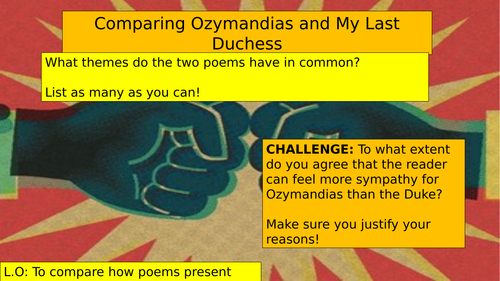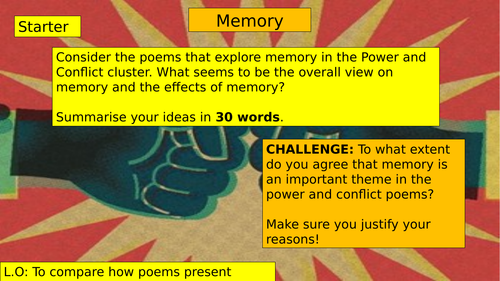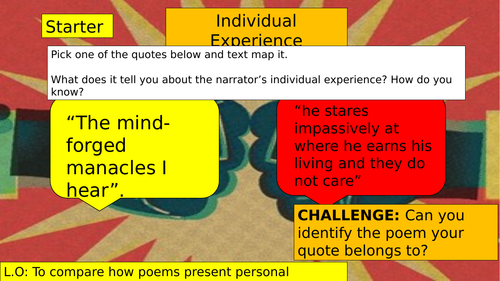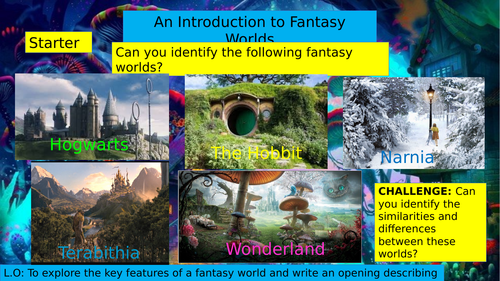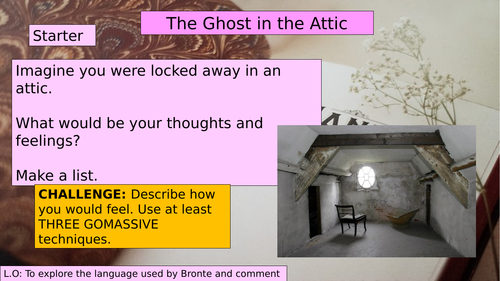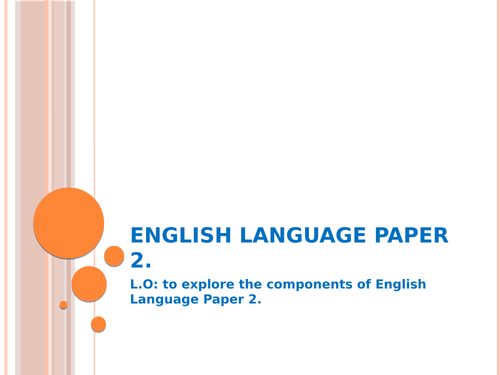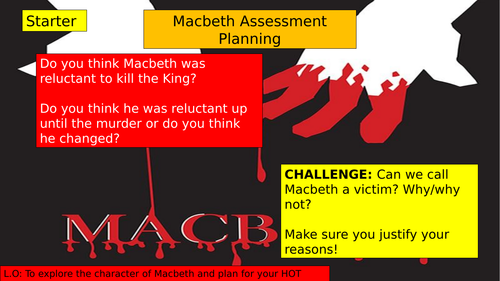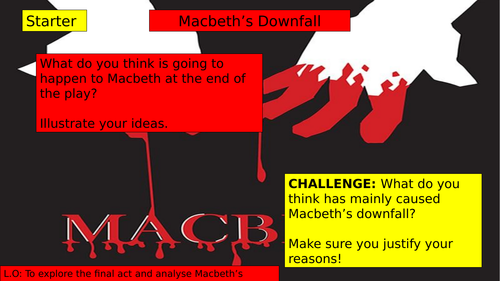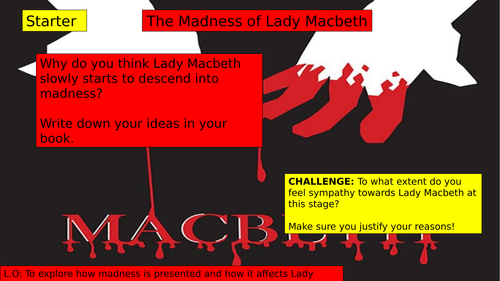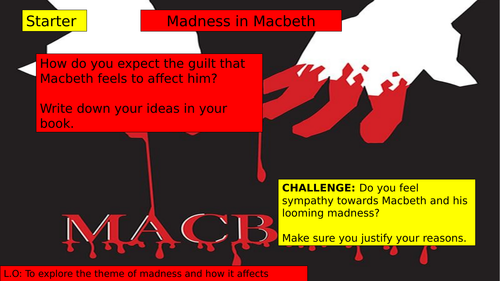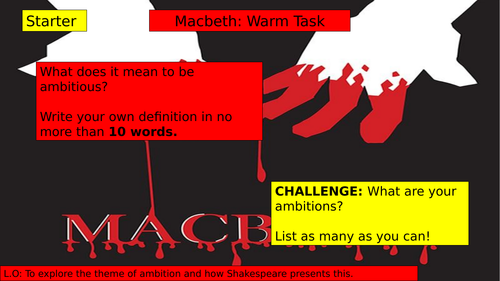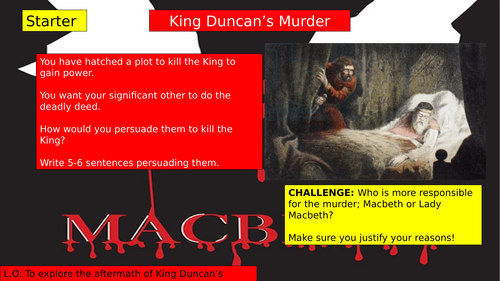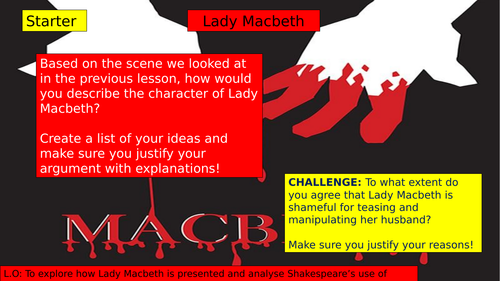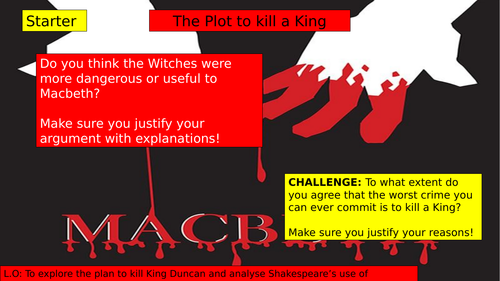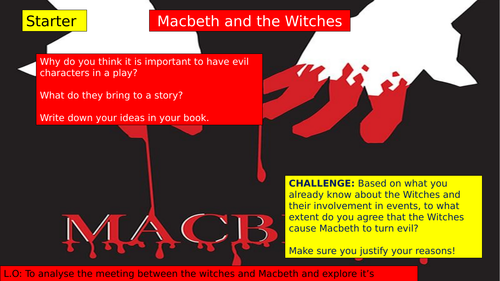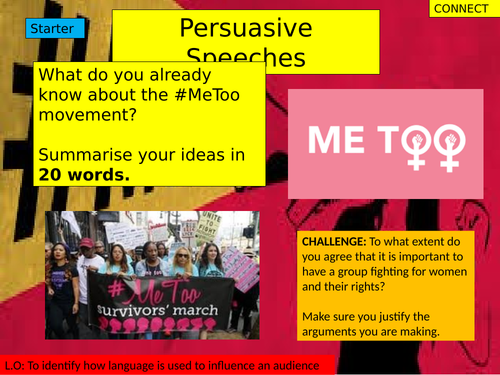60Uploads
19k+Views
4k+Downloads
All resources

AQA POWER AND CONFLICT POETRY: PRIDE
This is a GCSE lesson revision different types of pride in Ozymandias and My Last Duchess from the AQA Power and Conflict poetry cluster. The lesson features a range of activities that you can pick and chose from to suit your class. They range from pupils completing a table (included) to compare the two poems and the methods used by the poets to present pride; to a run through of each poem linking to the theme to then support pupils in writing a response to a GCSE question. This is easily adaptable for a KS4 class of any ability.

AQA POWER AND CONFLICT POETRY: MEMORY
This is a GCSE lesson revision focusing on memory and the AQA Power and Conflict poetry that explores this. The lesson features a range of activities that you can pick and chose from to suit your class. They range from a model text for pupils to annotate and identify the AOs in; to a planning sheet to support them in structuring a comparison essay. This is easily adaptable for a KS4 class of any ability. Planning sheet and model text copies are included.

GCSE POWER AND CONFLICT REVISION: INDIVIDUAL EXPERIENCE
This is a GCSE lesson revision on different types of individual experience that the AQA Power and Conflict poetry cluster explores. The lesson features a range of activities that you can pick and chose from to suit your class. They range from pupils completing a table to identify what poems link to different types of individual experience; to a run through of each poem linking to the theme to then support pupils in writing a response to a GCSE question. This is easily adaptable for a KS4 class of any ability.

KS3 7/8/9: Introduction to Fantasy Worlds
This is a lesson planned for a middle ability Year 8 class. It introduces pupils to fantasy worlds but initial discussing the worlds they know and based on this, what they think they key features of a fantasy world should be. There is then a brief example of an opening description of a fantasy world for them to discuss before they then have a extended writing task of writing their own opening. There are sentence starters to support pupils with their writing and level descriptions to aid them in their writing and the self-assessment task. This lesson can be easily adapted for a KS3 class of any ability.

Bertha from 'Jane Eyre' Diary Entry
This is a lesson for a middle-ability Year 8 class who were looking at Gothic literature. This lesson carries on from looking at an extract in ‘Jane Eyre’ where Bertha is finally revealed to the reader (see other Bertha lesson uploaded). The lesson requires pupils to imagine they are Bertha and write a diary entry detailing one of the days where she is locked inside the house/attic. There is an active activity where pupils can initially create a mime of Bertha, before they then plan and write their diary entry. Sentence starters are included to support pupils in their writing. This is easily adaptable for any KS3 or KS4 class.

Exploration of Bertha in Jane Eyre
This is a lesson for a middle-ability Year 8 class who were looking at Gothic literature. This lesson focuses on an extract from ‘Jane Eyre’ where Betha is finally revealed to the reader. The lesson requires pupils to look at initial quotes and explore their interpretations before then reading the extract, annotating it and writing an analytical paragraph on the extract. The extract is included in this resource and sentence starters using the PEACE structure are also included to support students. This is easily adaptable for any KS3 or KS4 class.

GCSE POWER AND CONFLICT POETRY REVISION- TYPES OF CONFLICT
This is a GCSE lesson revision different types of conflict that the AQA Power and Conflict poetry cluster explores. The lesson features a range of activities that you can pick and chose from to suit your class. They range from pupils create tables to identify what poems link to different types of conflict; there is also a model text of the beginning of a comparison essay that pupils can highlight to identify the AOs and use to support their own writing.

English Language Paper 2 Question 1
This is a short lesson focusing on question 1 of the English Language Paper 2 exam. It introduced the exam briefly to the students, before requiring them to look at an extract from the Daily Mail on Alison Hammond’s weight loss. The worksheet includes an extract from the article and a grid containing 8 statements. The lesson also allows pupils the opportunity to word their own 8 statements and to practice with their peers.

Macbeth: Macbeth's uncertainty GCSE-style assessment
This resource consists of two lessons focusing on a GCSE-style assessment. This has been planned for a middle-ability Year 9 class. The lesson focuses on the idea of whether Macbeth is truly a victim or not and requires pupils to consider a GCSE-style question on this where they must analyse an extract but also comment on other parts of the play. The first lesson focuses on them exploring the extract and planning a response (planning sheet included focusing on a PEACE structure) and the second lesson is more brief, allowing them plenty of time to write their assessment. This resource is easily adaptable for any KS3 or KS4 class of any ability.
Bundle

Macbeth Year 9 Bundle
This bundle consists of 8 lessons focusing on key scenes from Macbeth and supporting pupils with key skills such as identifying language techniques, considering their effect and why Shakespeare has used them and writing GCSE-style responses. All lessons have key extracts included and sentence starters are also included to support pupils with the structure of their writing. These lessons are aimed at a middle-ability Year 9 class but they can be easily adapted to any KS3 or KS4 class.

Macbeth: Macbeth's Downfall
This is a middle-ability Year 9 lesson focusing on the final scene of Macbeth and his downfall. Pupils will need to consider who they think is responsible for the downfall of Macbeth and they will consider why they think the play ends with his death and why Shakespeare may have done this. The tasks are split into manageable activities that allow pupils to analyse key language techniques and the effects and meanings they create. A debate activity is also included to allow pupils to practice supporting an argument and this will also support them in then writing GCSE-style paragraph(s) exploring alternative arguments and interpretations. This lesson is easily adaptable to a KS3 or KS4 class of any ability.

Macbeth: Lady Macbeth's Madness
This is a middle-ability Year 9 lesson exploring the madness of Lady Macbeth. The extract of the crucial scene is included and pupils are required to consider how Lady Macbeth is presented in the scene and how they respond to her madness. T make it more manageable, a table has been provided that requires pupils to find evidence in the extract to support statements made and they will also need to identify language techniques used. There are also sentence starters provided to support pupils in writing an analytical response. This lesson is easily adaptable to a KS3 or KS4 class of any ability.

Macbeth: Madness
This is a middle-ability Year 9 lesson exploring how madness is presented in Macbeth. The banquet scene (extract included) is explored in the lesson and pupils will consider the level of guilt Macbeth is experiencing and the effect it is now having on him. A video clip is also included showing the banquet scene from the Michael Fassbender adaptation (to allow them to see the scene played out and understand the extent of madness Macbeth is experiencing). The tasks relating to the extract have been broken down into manageable tasks and a model text is also included to support pupils in beginning to write a GCSE-style response. This lesson is easily adaptable to a KS3 or KS4 class of any ability.

Macbeth: Ambition Essay Question
This is an assessment lesson for a middle-ability Year 9 class. The lesson looks at the theme of ambition in the play. Pupils will initially revise key scenes where ambition is clearly displayed in the play; before then looking at a short extract (Macbeth’s response to the Witches’ prophecies) and using this to answer a GCSE-style question. There is a planning sheet included that will support pupils in planning THREE paragraphs to use as their response. This lesson is easily adaptable for a KS3 or KS4 class of any ability.

Macbeth: Duncan's Murder
This is a middle-ability Year 9 lesson focusing on the murder of King Duncan and Shakespeare’s presentation of Macbeth and Lady Macbeth during this. A short extract from the scene is explored in the lesson (the extract is included). Pupils are required to continue to focus on skills such as identifying and analysing a range of language techniques that Shakespeare has used and consider why he has used them. There is also an activity for pupils to be challenged further to closely analyse a quote to gain a range of interpretations. Lastly, there is the opportunity for creative writing to help them understand the characters further. Sentence starters are also provided to support them with their writing. This lesson is easily adaptable for a KS3 or KS4 class of any ability.

Macbeth: Exploration of Macbeth
This is a middle-ability Year 9 lesson focusing on the characterisation of Macbeth and Shakespeare’s use of symbolism through a dagger. The short ‘Is this a dagger I see before me?’ soliloquy is explored in the lesson (the extract is included). It has been divided into sections to make it more manageable for pupils to identify language techniques used and the consider the effect they create. Also included, is a short video of the Patrick Stewart performance to help pupils understand how the scene would be played out and to help them with their understanding of Macbeth. Sentence starters are also provided to support them with their writing. This lesson is easily adaptable for a KS3 or KS4 class of any ability.

Macbeth: Exploration of Lady Macbeth
This is one whole lesson for a middle- ability Year 9 class focusing on the characterisation of Lady Macbeth. The lesson focuses on a short extract and requires students to consider gender stereotypes during the Shakespearian era and how Lady Macbeth subverts them. The tasks are split into sections to make them more manageable and sentence starters are provided to support pupils in their writing. The extract for the lesson is also included and the lesson can be easily adapted to a KS3 or KS4 class of any ability.

Macbeth: The Plot to kill a King
This is one whole lesson for a middle- ability Year 9 class focusing of Macbeth and Lady Macbeth plotting to kill King Duncan. The lesson focuses on a short extract from the scene and requires students to consider gender stereotypes during the Shakespearian era and how Macbeth and Lady Macbeth subvert them. The tasks are split into sections to make them more manageable and sentence starters are provided to support pupils in their writing. The extract for the lesson is also included and the lesson can be easily adapted to a KS3 or KS4 class of any ability.

Macbeth's first meeting with the Witches
This is one lesson for a middle-ability Year 9 class looking at the scene where Macbeth and Banquo first meet the Witches. The lesson predominantly focuses on the prophecies the Witches provide and the significance of these. The initial reactions of Macbeth and Banquo are also explored with supporting questions to answer. A model text of a paragraph responding to a GCSE-style question is also included, as well as the extracts of Macbeth and Banquo’s reactions. This can easily be adapted for any KS3 or KS4 class.

Injustice themed bundle of lessons
This bundle consists of seven lessons focusing on the theme of ‘Injustice’, These English lessons were planned for a high-ability KS3 class, focusing on building key skills in relation to the English Language Paper 2 exam. The lessons focus on the #MeToo movement (involving an assessment to test pupils’ initial skills), two lessons focusing on the impact of Malala and writers’ differing attitudes to this and attitudes towards women in the media, as well as Martin Luther King’s famous speech. These lessons explore both analytical and creative writing skills and are easily adaptable for all KS3 class of all abilities.

